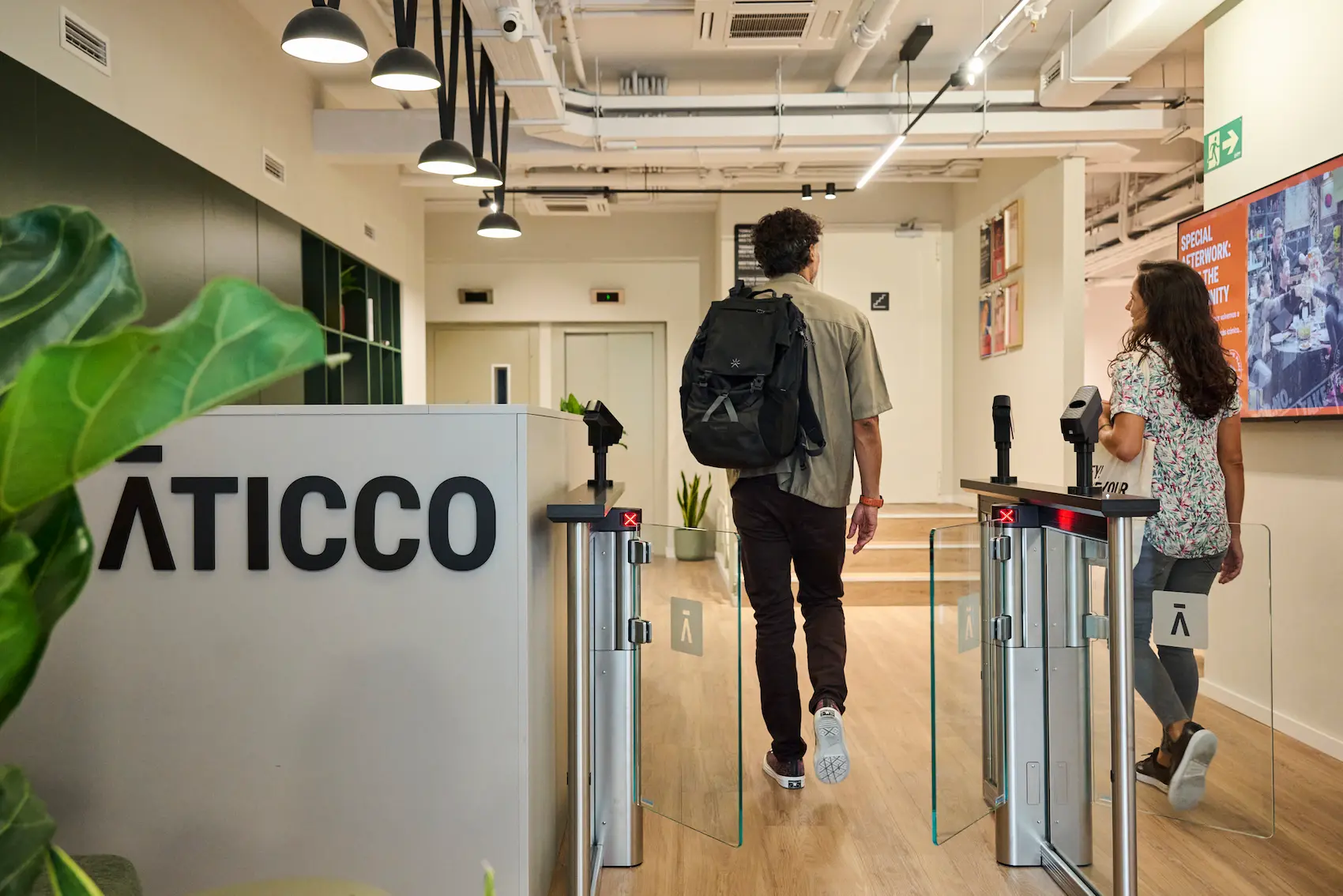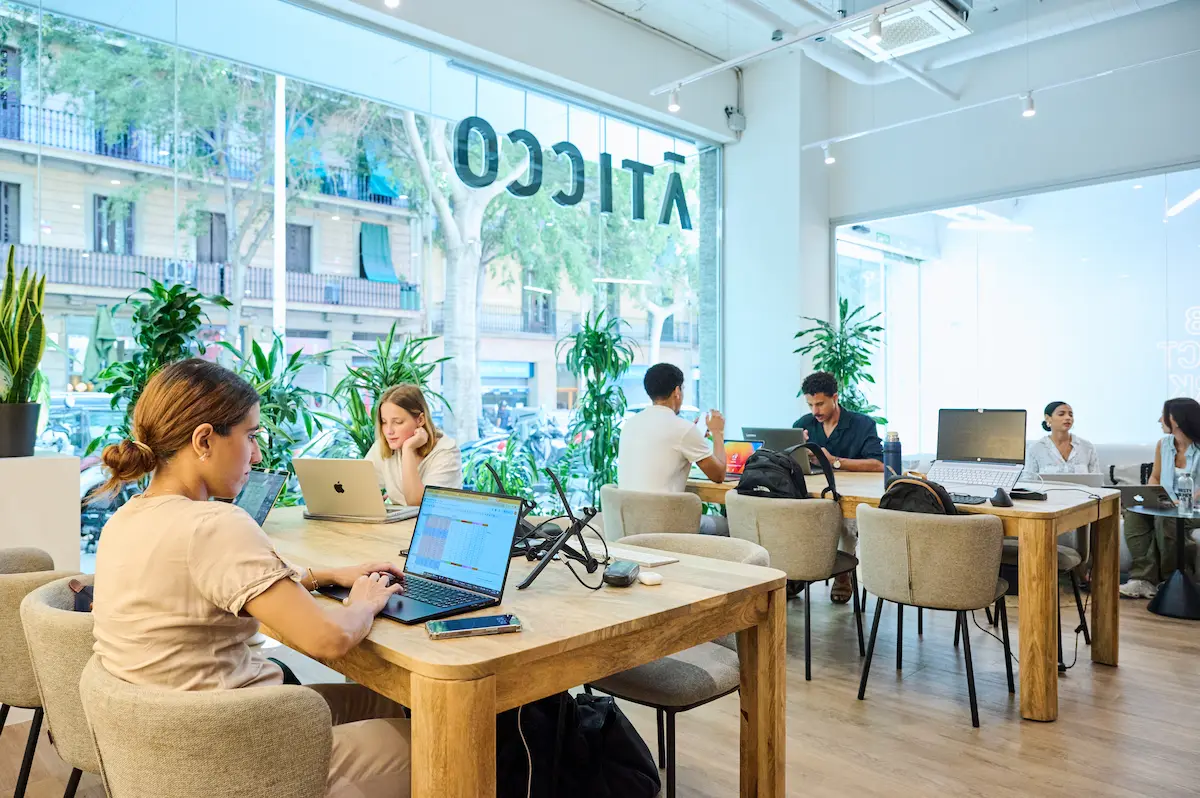Working from home: beyond the couch

Increasingly, the number of people who for different reasons prefer to work from home is growing. You yourself may be one of them.
Why is working from home no longer an option, but a strategic decision?
Today, working from home is part of the work fabric. More than 55 % of professionals in Spain choose to do so even during the summer, and 14.6 % practice it regularly. The preference is clear: 51% consider that they perform better at home than in the office, and almost half say they have improved their work results.
Concrete benefits of working from home
- Increased concentration and results
The data confirms it: the level of focus rises from 66% to 71% on remote days, and in managerial profiles it reaches 83%. Studies show that most workers feel more productive working from home.
- Real personal well-being
Working from home frees up time: the equivalent of 10 days off a year, according to research by the Institute of Labor Economics. It also encourages healthier habits, less stress and more family time off.
- Satisfaction and retention
Hybrid workdays (2 days at home, 3 days in the office) have shown a notable reduction in quit rates and an increase in job satisfaction.
How to organize yourself to work from home
Your ideal work corner
-
Choose a fixed space: light it well, make it quiet, avoid distractions such as the television.
-
Invest in ergonomic equipment: chair, table, monitor... your health will thank you in the medium term.
Tools that make a difference
-
Communication: Slack or Teams keeps the team connected.
-
Projects: Trello, Asana or Monday help to visualize pending and progress.
-
Personal control: Toggl or RescueTime help you optimize your time.
Routines that separate life and work
Set clear schedules and boundaries. Define a ritual at the end of the day (such as closing the screen or leaving the workspace) to help you disconnect.
Common challenges and how to overcome them
| Challenge | What can happen | How to prevent it |
|---|---|---|
| Occupational isolation | Loss of emotional connection with the team | Informal virtual meetings, social breaks, check-ins, etc. |
| Professional overload | Longer working days due to lack of clear boundaries | Manage schedules, turn off notifications outside the workday |
| Uneven visibility | More value is given to those who appear more in person | Hybrid presence at key meetings, fair use of metrics |
Legal framework in Spain (key if you spend more than 30% of your working day at home)
Working from home goes beyond "I log in from my living room". From 30% of telework in three months, the law requires:
-
Written agreement between employer and employee.
-
Equal rights: training, promotion, equal treatment, digital disconnection, data protection.
-
Corporate commitment to equipment, cybersecurity and risk prevention in the home environment.
Trends and tools
-
Customized hybrid models (custom-equipped, with real flexibility) are on the rise.
-
Technology is evolving fast: virtual reality, more secure VPNs, AI that automates routine tasks... all driving work from home.
-
The focus is no longer just on productivity, but on integral wellness, mental health and a sustainable model.
The importance of creating routines
The environment
We start with something simple. If you are going to work from home, you will have a space adapted for it; a table, a desk, another room... But you are at home and there is surely something that you do not get rid of: the mobile phone.
Your first routine is going to be the following, every day when you sit down or enter that room, you are going to leave your mobile phone outside. Surely you have one for work or a landline where customers can contact you; your private mobile phone where your friends send you WhatsApps at all hours is not something you should have with you.
On the other hand, it is proven that a positive environment becomes a productive environment. We love working with piped music and one of the advantages of working from home in terms of atmosphere is that you are the DJ.
The schedule
Generally, we are all used to working 8 hours straight in an office. Now that you have the option of working from home, that may be the last thing you want to do. So we are going to propose something foolproof to decide what hours you are going to do it. For example, you may want to take Friday afternoons off because you are meeting your friends, or enter later on Wednesdays because you are taking your children to school.
Our idea is the following: do tests. Just like that. The only way to know if we like something, if something really matches our needs is to test if it works. You may think that you are going to perform better if you get up at 7 but it turns out that getting up early is not your thing. It is about you yourself assessing what needs you have to work from home and based on that, you adapt.
The question is to set some parameters that you are willing to follow when you decide what your best schedule is. After all, you don't need 8 hours a day to perform like 8 hours, do you?
Breaks
Working from home for so many hours straight without stopping can be a personal drain that can only be solved by reducing your productivity. This is like driving, remember to make a technical stop along the way.
However, we are at home. Our advice is that your breaks also keep to a schedule, simply because of one thing: distraction. When we are at home, we can get distracted by everything, even by the household chores that we were slowly putting off.
As you can see, working from home has more complicated aspects than it may seem at first. But it also has very positive things like reducing stress. We don't have to get up at a time we're unhappy with, we don't have to take a subway or bus running, we don't have two-hour traffic jams to get downtown, and we don't have to get up just two hours early to get to the office on time. Working from home can't offer you more time flexibility; let's learn to use these advantages in our favor.
Pure routine
A good routine can increase our productivity when working from home to unknown levels. You, as an adult and worker, have full knowledge of what tasks you have to carry out; that is why you will be your best organizer. But let's see what kind of days exist in our agenda.
- The day of boom
- The day of doom
- The following day
- Establish a daily routine: Define clear schedules to start and end your day, and stick to them consistently to generate healthy habits.
- Disconnect from household chores: Physically separate your workspace from your rest area and avoid doing household chores during your working hours.
- Take active breaks: Take at least 5 minutes every hour to stretch, do breathing exercises, or even go for a short walk.
- Practice mindfulness: Techniques such as meditation, mindfulness exercises, or even reflective writing can help reduce anxiety, improve concentration, and increase mental clarity.
- Good lighting and ventilation.
- Inspiring elements: Plants, art, or motivational phrases.
- Avoid working from your bed or sofa.
- Invest in ergonomic furniture: A good chair and a suitable desk can make a difference in your comfort and postural health.
Depending on your sector and how you are working, a Monday may be the day you waste the most time sending and receiving emails. Therefore, never set that Monday as the deadline for a project, as that is precisely when you will need the most time; working from home does not save you from email threads with the client in question.
Fridays are our downfall. Let's assume above all that Fridays are the day we want to be most free in our lives, that we are thinking of going out for drinks with our friends before working from home... let's face it! Motivation is key in our routine in the search for productivity. Marking a Friday off is neither a sin nor does it hurt.
You may not have a Monday or Friday like the one mentioned, but surely when reading it, your subconscious has identified which day of your week is most like that. Simply apply it.
Every day, whether it is Monday or Wednesday, you should sit at your desk to work from home knowing what tasks you have to do. Throughout that same day different tasks may arise that you will add to that list of tasks but remember, everything must have labels: important, urgent, in process, finished.
Managing emotions in remote work
To maintain a positive emotional balance, it is essential to develop effective strategies to manage frustration and lack of motivation.
Strategies to cope with frustration and stress from home
Create a workspace that inspires you
Your environment directly influences your emotional state. Design a space that promotes creativity and concentration:
At Aticco, our coworking spaces are designed with these principles in mind, offering an optimal environment for your productivity and well-being. Visit us and discover how we can help you improve your work experience!


